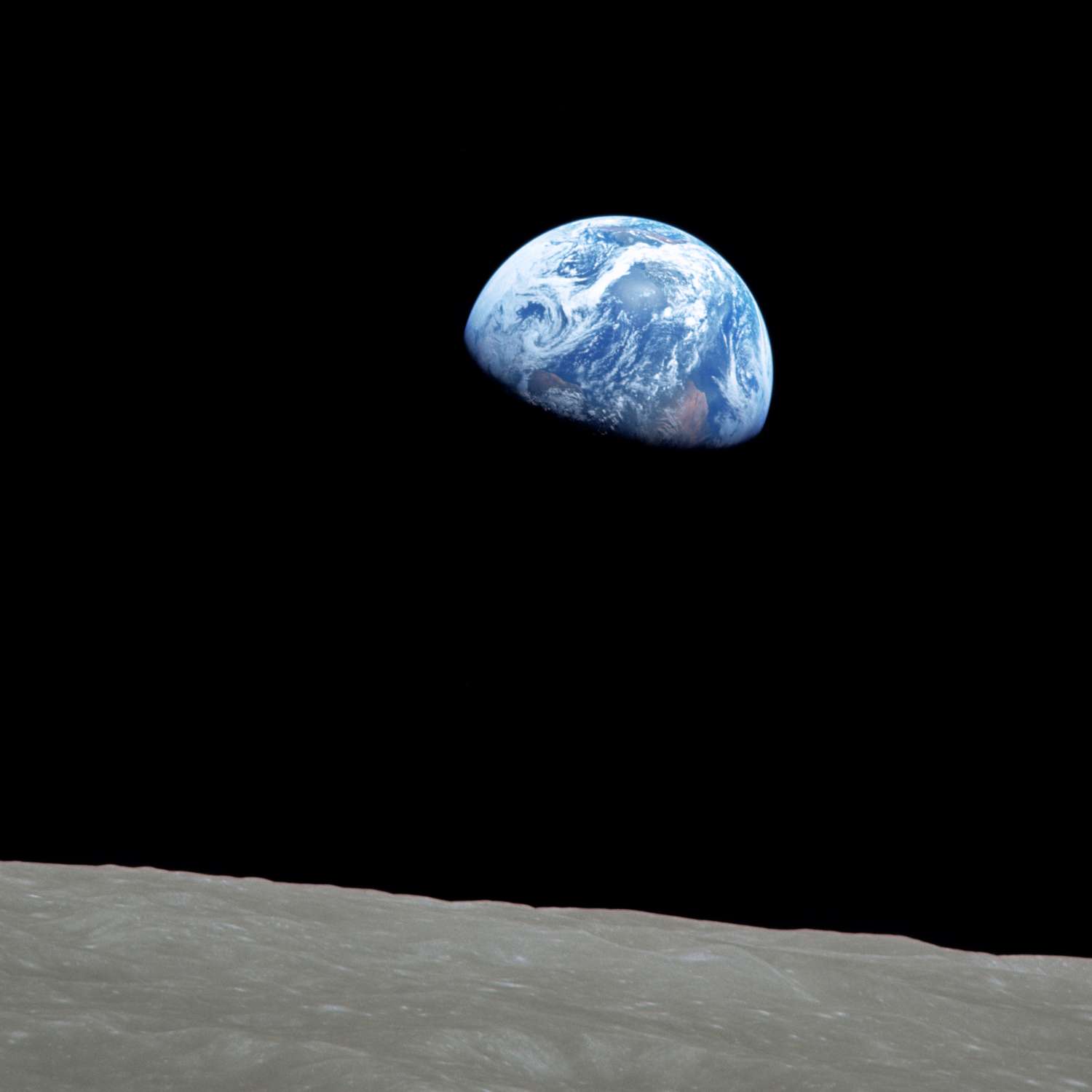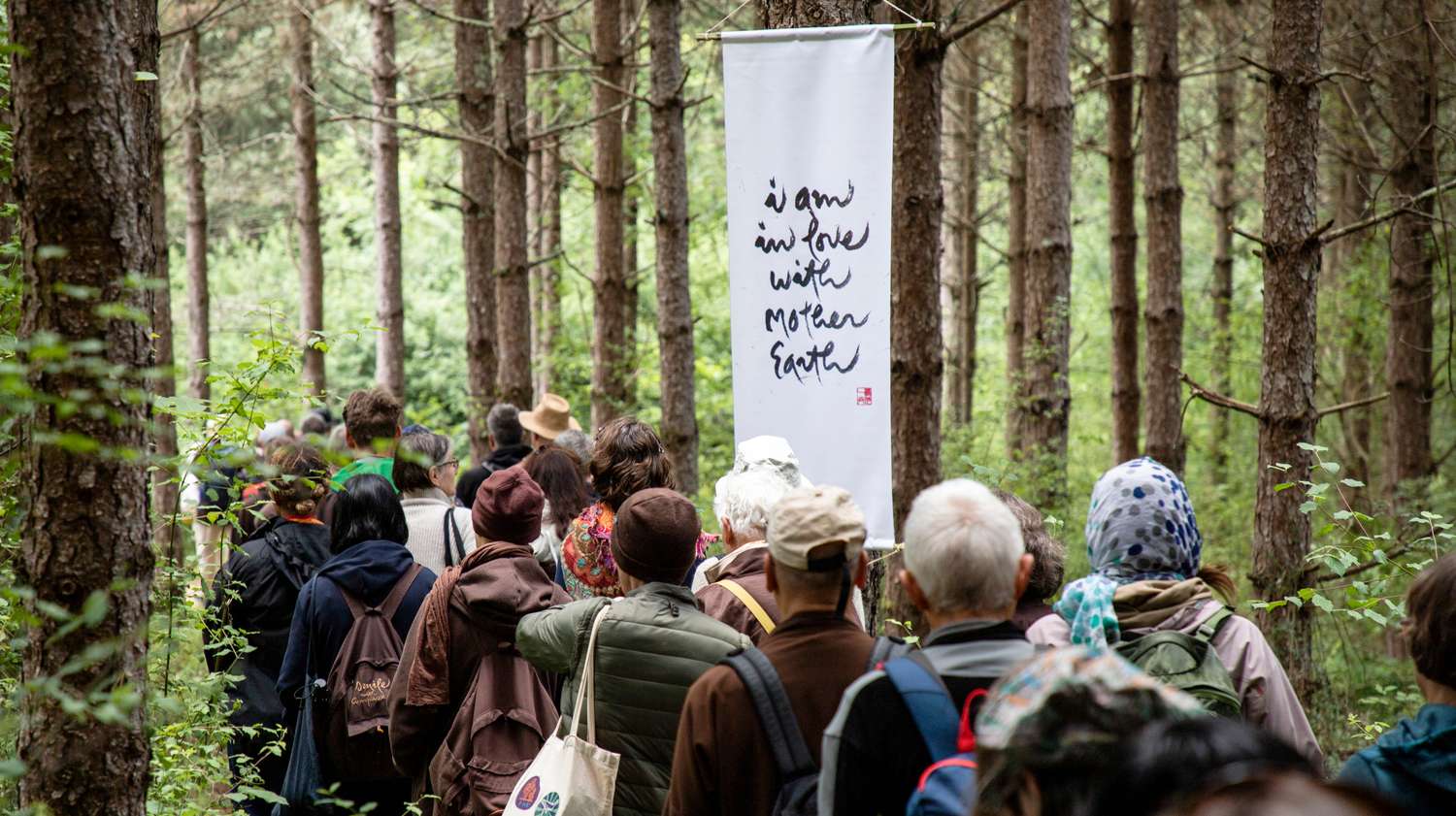
A Dharma Talk by Thay
Dear Sangha,
Today is the 13th of February 2011, and we are in the Loving Kindness Temple (New Hamlet) Plum Village, in our Winter Rains Retreat.
We are sitting here in a small village in the south of France. Why have we come here? Let us broaden our mind and use our mind’s eye to see that person, who is not here, who is far away, perhaps in Asia, America, or Africa. What are they doing at this moment? Are they someone we love or someone we hate? Where are they and what are they doing? Look with the mind’s eye! Are they asleep, or if awake, what are they doing?
If we know how to sit still and see that person from afar, we have a chance to see them more clearly. We sit still for a while and see them completely engrossed in something, in a corner of the world somewhere. We only need to sit and use our consciousness to see and in five or ten minutes, we are filled with love and sympathy for that person. In the past you may have been upset with, blamed or criticized that person. Now you sit here alone in a faraway village and you have a chance to look back. And because you are far away, you can see very clearly.
Sometimes we have to go far away to see what we want to see. We live side by side and interact with each other day in and day out but still we do not see. It isn’t until we have gone very far, so far that we may never meet again that we then start seeing that person and feel sympathy for them. It’s a pity for them and for us that we did not know how to relate to them and treasure them.
Look Down From Up High
In the past when Thay read the stories of Hans Christian Anderson, Thay loved one of them very much. It’s a short story called A Great Grief. There were two brothers standing on a rooftop of a high building looking down. On the ground there was a group of children playing. A dog had just died and they wanted to bury it. They made a grave for the dog and they made it very beautifully. They thought, it’s such a beautiful grave, if they didn’t let the other children see it, it would be such a shame. They announced to all the children in the village that they could visit the grave.
The children had to have a ticket to enter - the ticket was one of their buttons from a shirt or trousers. Many children wore overalls. When they tore off a button, the overalls didn’t fall because there was a button on the other side. Some children had five, six buttons on their shirts so it was not a problem for them either. All the children really wanted to see the grave. When they saw other children entering and they had not gone in, they would pull off any coat or trouser button for a ticket.
After all the children had gone in to see the dog’s grave, there was a poor, small girl still outside. She did not have a single button; her clothes were tattered. All the children had gone in and she was the only one who had to stand outside. She was so upset and cried bitterly. She was the only child in the entire village who could not enter because she did not have any buttons.
The two brothers on the rooftop saw everything from the beginning to the end. The younger one said, “Looking from high up here, it’s hardly worth crying over not having a button to enter!” But the child below did not know that. When we see from above, we see very differently our own pain and the pain of the other. Thay doesn’t remember exactly the original line, but that was the essential meaning. Thay remembers vividly that short story of only one and a half pages.
Treading the Path That Leads to the Moon
The first time human beings organized a very far journey, it was to the moon. Apollo 11 was the name of that expedition. It took a great deal of money and energy to send a few astronauts to the moon.
When the spaceship flew out of the Earth’s atmosphere, the astronauts were able to capture images of the Earth for the first time in history. Back then, Thay wrote a poem about this event called Morning of Peace:
Treading the path that leads to the moon,
I look back and can’t stop marveling.
I see a bubble of water on the immense ocean of space.
It is the Earth, our green planet,
her sumptuous beauty sparkling and proud,
yet oh so fragile.
…
Going out into space and looking back, they saw how beautiful our Planet Earth is. In this solar system or the universe, we had never seen anything as beautiful and ephemeral like that. When the astronauts landed on the moon and walked on it, they saw the moon was very different, there was no life. At night on the moon they could see their way thanks to the light of the sun reflected from the Earth. Standing on the Earth we see the moon rise, and on the moon they saw the Earth rise. The Earth rises very beautifully - not golden, but shades of blue and white. Those images were sent back to us humans on Earth.

The members of the Apollo 11 expedition were deeply moved when they saw the image of Earth. They described the space on the moon as bitterly cold and inhospitable. On Earth they had never seen darkness like the darkness of outer space. There may also be pitch dark nights on Earth, but that darkness is alive, there is warmth, sounds and fragrance. But the darkness on the moon is terribly cold and black. Although there was the reflected gleam of the sun, they could see nothing. The universe up there is empty. Light has to encounter something for us to be able to see it. When light travels in empty space we do not see it. The color blue that we see when we look up at the sky is not there in outer space. It is thanks to the layers of atmosphere that when the sunlight shines on them, we see the blue sky. Once you have left the Earth’s atmosphere, the blue is no longer there. There is just pitch black, a freezing pitch black.
Looking down at the Earth, a feeling of great love rose up in the astronauts. They visualized billions of Earth’s inhabitants and what were they doing? Eating, sleeping, working, being angry with each other, fighting and killing each other for an inch of territory. What a shame. Whites are against Blacks and Blacks are against whites. People in the North are against people in the South and people in the South are against people in the North. When we are far away and look back, we see things differently. We see that we humans are crazy and very foolish. We have such a beautiful and marvelous planet and yet, we are in the process of destroying it.
One astronaut (Edgar Mitchell) upon returning to Earth said, “We went to the moon as technicians; we returned as humanitarians.” We need a journey like that to see clearly who we are, how precious our planet is, and how foolish we are. We live on it and we do not know what it is, we do not treasure it and we are letting it be destroyed.
Our life is the same. We all have life but we do not know how to value it. We waste our time and use it unwisely. We waste our lives and our time as if we were burning one hundred dollar bills, one after another. We inflict suffering on each other and look for something we call happiness. Meanwhile, we are accumulating unhappiness and causing each other to suffer. That is what is happening right here and now, but we don’t see it. Sometimes we have to go very far to look back and then we shall see - heaven is right where we are living.
The astronauts said, the moon and the stars are very beautiful, but freezing cold. That is not our place. It is only that tiny planet with its shades of blue and white that is our home, that welcomes us. We are living in our home, but we do not treasure it and the time we have to live on it. The images the astronauts sent back are a bell of mindfulness. Seeing those images is like hearing the sound of the bell, we need to wake up. Wake up to see, to understand, to love, and to treasure.
Eyes of the World
Only a few hundred astronauts have had a chance to leave the Earth. They are our brothers and sisters, our representatives who leave the planet, look down and report back to us. It is like our body which is tens of kilos, and has eyes which are only a few grams, but those eyes can see and report back to the whole body. We have our eyes - they are those first astronauts who flew out of the Earth’s orbit to go to the moon. They knew their mission was very dangerous, and that they might never return. They explored the moon not for themselves but for humankind. The human race needed to take the first steps and so needed those pioneers who would sacrifice themselves and go first.
The astronauts also had families and knew the dangers awaiting them. When someone asked one of the astronauts, “Were you able to sleep last night?” He replied, “Yes I slept.” “Did you take sleeping pills?” “No! I didn’t take sleeping pills, but I had terrible nightmares.” Because he knew once he climbed into the spaceship, he might never return.
Those astronauts are our eyes that we sent into space to see for us. When our eyes reported back, did we listen, did we see anything? We have to educate our children so they can see the preciousness of life and the Planet Earth, see the preciousness of being born, growing up, walking and breathing on this planet. That is awakening. Once you see this, it is happiness to take a step and happiness to speak a word. When we come in touch with Mother Earth, each of our steps is filled with love, each word we speak is filled with love. That insight changes us completely.
The Buddha was also our eyes. He did not need to travel into space, he just needed to sit under a Bodhi tree. But with the eyes of his mind he saw very deeply and reported to us that there is a world of freedom, which is nirvana. And there is a way to that freedom, which is the Noble Eightfold Path. In the past many of his disciples praised him as the eyes of the world.

The astronauts also followed that path. They volunteered to be the eyes, to see for us and transmit to us the insight. Have we seen it or not? How many bells have been sounded and how many images have been sent back? Yet we still live in slumber, we continue to inflict suffering on each other, and to destroy this one-of-a-kind work of art of the universe. As parents, teachers, elder brothers and sisters, you must have this insight and transmit it to your children and younger siblings. We have to wake up. If not it will be too late! Buddhism is called the Path of Enlightenment. Enlightenment means just this.